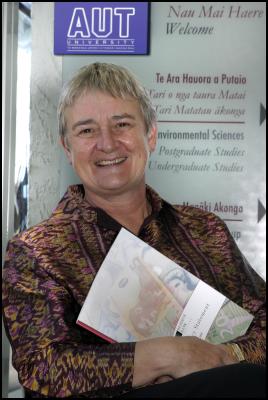Prof. Marilyn Waring: Rebel voice of the Pacific
Professor Marilyn Waring: Rebel voice of the Pacific

Click to enlarge
AUT University media release:
Professor Marilyn Waring: Rebel voice of the Pacific
For the past three decades, Professor Marilyn Waring has been challenging economic models and crusading for women's rights. Her reputation as a powerful, and distinctive, voice on the global stage has been confirmed in a new book, Rebel Voices of the World.
Professor Waring, based at AUT University's Institute of Public Policy, says it is a "great honour" to be one of the 16 prominent intellectuals handpicked for the French publication. The political economist and former National MP's work appears alongside such luminaries as Ken Loach, Maude Barlow, Walden Bello and Susan George.
The book's authors present their "visions, hopes and fears for the planet up to the year 2015". Professor Waring's chapter - 'The South Pacific and the Antarctic: A region under threat' - examines the region's turbulent history, dissects current economic policy and highlights future challenges.
She covers such topics as the Fijian coups, nuclear testing and East Timor's plight. In her examination of political representation from women in the Pacific, Professor Waring argues that it's "second only to the Gulf region as the worst in the world".
Twenty-three years after her rebelliousness led to the downfall of the Muldoon Government, Marilyn Waring is still a big name - more so internationally than nationally. In Canada, as an advocate for a new measure of wellbeing, she draws huge crowds at discussion forums and is often stopped by autograph-hunting students. Her profile was boosted by a Canadian documentary Who's Counting: Sex, Lies and Global Economics based on her work.
"The documentary is often mandatory viewing for students throughout Canada. It's a tremendous influence there, as well as in several other places including Australia, Africa and South America. But I'm looking forward to the day when the film's subject matter has no significance."
In recognition of her extensive contribution to fostering better public policy, Professor Waring was recently appointed to the blue ribbon board that oversees the Canadian Index of Wellbeing (CIW). CIW is the largest wellbeing project in the world and aims to provide a more accurate barometer of Canadian life. Professor Waring is one of only two foreigners on the board.
Professor Waring argues that GDP ignores the swathes of social life where numbers are difficult to assess but are vital for our sense of wellbeing - such as childcare and other unpaid work traditionally done by women. She also argues GDP counts negatives such as security and other costs of crime as if they were as valuable as food or housing. Her innovative work has inspired many others to work on human-scale economic alternatives, local currency exchanges and more humane ways of measuring the quality of life.
During her nine-year career in politics, Professor Waring never shied from confrontation. She become National MP for Raglan in 1975 at the age of 22, but was soon at odds with Prime Minister Rob Muldoon. When she crossed the floor to support a Labour bill to ban nuclear-armed ships in 1984, Sir Robert called a snap selection, which he lost.
Professor Waring, who has a PhD in political economy from Waikato University, is a sought-after development consultant, author of four books and on the Board of Directors of the Reserve Bank. As AUT's Professor of Public Policy, she supervises postgraduate students and says her role has the potential to influence a new generation of policy makers.
"There is always a point in PhD supervisions where the student transcends your knowledge of a particular area - that's when it becomes really exciting. I'm enjoying my work at AUT. I have every opportunity to be the best academic I can possibly be."
Professor
Marilyn Waring will give a public address at AUT University
on Tuesday, April 3, 4.30pm.
When Leadership Fails: a comparative public policy analysis of human rights and the Canadian and New Zealand outcomes on the issue of equality, dignity and marriage.
Advocacy for equal rights for gay and lesbian people, and in particular the right to marriage, took place in Canada and New Zealand over the same decade. The countries share the same international human rights obligations, and their domestic law uses exactly the same words on justified limitations to the full guarantees of rights and freedoms to all citizens.
By comparing the way party political leaders, the courts, and gay and lesbian advocates framed the issue, Professor Waring will show why Canada finished up with full equality and New Zealand finished up with equivalence, but not equal human rights.
When: 4.30-5.30pm, Tuesday, April 3,
2007
Where: WA 220 Lecture Theatre, ground floor, Te
Amorangi Building (A Block), AUT City Campus, Wellesley
St.
ENDS


 Paralympics NZ: Four Further Paralympians Presented With Official Numbered Pins
Paralympics NZ: Four Further Paralympians Presented With Official Numbered Pins New Zealand Veterinary Association: Animal Owners Urged To Make A List And Check It Twice These Summer Holidays
New Zealand Veterinary Association: Animal Owners Urged To Make A List And Check It Twice These Summer Holidays Auckland Pride: First Line Up Of Programming Featuring Brand New Events And The Return Of Pride Favourites
Auckland Pride: First Line Up Of Programming Featuring Brand New Events And The Return Of Pride Favourites Age Concern Wellington Region: Loneliness As A Major Issue For Many Seniors This Christmas
Age Concern Wellington Region: Loneliness As A Major Issue For Many Seniors This Christmas We are the University: Open Letter - Cuts To Marsden Funding For Humanities And Social Sciences
We are the University: Open Letter - Cuts To Marsden Funding For Humanities And Social Sciences